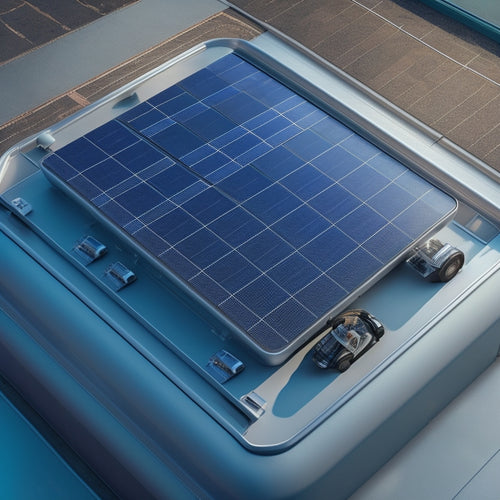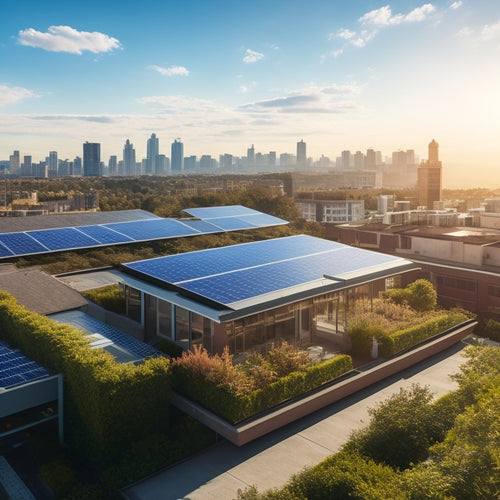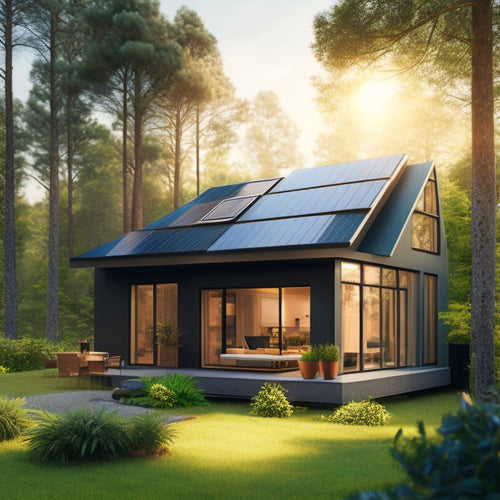
Best Solar Panel Packages for Homes
Share
When selecting the best solar panel package for your home, you're not just choosing a product - you're investing in a customized energy solution that should be customized to your unique energy needs, budget, and lifestyle. To get started, understand your energy needs by conducting an energy audit, which helps identify your current usage patterns and inefficiencies. Then, research top solar panel brands like SunPower, Panasonic, and Tesla, and consider budget-friendly options like Trina, Jinko, and Hanwha Q CELLS. As you assess your options, keep in mind key features like efficiency, panel types, and durability, and uncover how premium packages and energy storage solutions can enhance your investment - now, take the next step towards a customized solution that's right for you.
Key Takeaways
- Conduct an energy audit to identify current usage patterns, inefficiencies, and peak hours to determine the optimal solar panel package.
- Choose a reputable brand offering high-efficiency solar panels with comprehensive warranties, such as SunPower, Panasonic, or Tesla.
- Residential solar systems provide affordability, high efficiency, and professional services, with benefits like solar incentives and financing options.
- Custom solar solutions cater to specific energy requirements, optimizing for unique conditions, and can integrate with existing systems.
- Key features to consider include solar efficiency, panel types, durability, and environmental impact when selecting the best solar panel package for your home.
Top Solar Panel Brands
When shopping for solar panels, you're likely to come across a multitude of brands, each boasting its own unique features and benefits. To make an informed decision, it's vital to compare top brands in the solar technology industry.
Brand comparison is significant in evaluating the performance, durability, and efficiency of solar panels. Leading brands like SunPower, Panasonic, and Tesla offer high-efficiency solar panels with advanced features like bifacial technology and enhanced durability.
On the other hand, budget-friendly options like Trina, Jinko, and Hanwha Q CELLS provide affordable solutions without compromising on performance. When comparing brands, consider factors like warranty periods, temperature coefficients, and power output.
Reputable brands like Canadian Solar and LG offer a range of solar panels with varying wattage and voltage outputs. By evaluating these key factors, you can make an informed decision about the best solar panel brand for your specific needs.
Understanding Your Energy Needs
You need to understand your energy needs to determine the right solar panel package for your home.
Start by evaluating your current energy usage to identify patterns and areas of inefficiency.
You'll also want to identify your peak hours and analyze your energy consumption to get a clear view of your energy requirements.
Assess Current Energy Usage
About 30% of your average monthly electricity bill goes towards powering appliances, lighting, and heating or cooling systems.
To optimize your energy usage and identify areas for improvement, it's crucial to assess your current energy consumption. Conducting an energy audit helps you understand your energy usage patterns, highlighting opportunities to reduce waste and optimize your energy expenditure.
You'll need to examine your energy usage over a prolonged period to identify trends and patterns. Analyze your past electricity bills to determine your average daily energy consumption in kilowatt-hours (kWh).
This information will help you understand how much energy you need to generate with your solar panel system. Additionally, consider your energy usage during different times of the day, week, and year to identify peak and off-peak periods.
Identify Peak Hours
Having determined your average daily energy consumption, it's now necessary to pinpoint the periods when your energy usage peaks. This information is essential in determining the best solar panel package for your home.
To identify peak hours, you'll want to analyze your energy usage patterns throughout the day. Here are 4 key factors to keep in mind:
-
Morning peak: When you wake up, you likely turn on lights, start appliances, and begin using devices, causing a spike in energy consumption.
-
Afternoon peak: As the day progresses, energy usage tends to increase with the use of air conditioning, refrigeration, and other appliances.
-
Evening peak: When you return home from work or school, energy consumption peaks again with the use of lighting, electronics, and cooking appliances.
- Peak sunlight hours: Coinciding with the afternoon peak, peak sunlight hours (usually between 11 am and 3 pm) are when solar energy production is at its highest.
Understanding these peak hours will help you determine the ideal solar panel package to meet your energy needs, ensuring you maximize your solar energy production during peak sunlight hours.
Analyze Energy Consumption
Analyze Energy Consumption (Understanding Your Energy Needs)
Your home's energy environment is dotted with various appliances, devices, and systems, each consuming power at different rates and intervals. To optimize energy efficiency, it's essential to understand your consumption patterns. This involves identifying the energy-hungry devices, their usage periods, and the total energy consumed.
| Appliance/Device | Average Energy Consumption (Watts) | Usage Hours/Day |
|---|---|---|
| Refrigerator | 150-200 | 24 |
| Air Conditioner | 900-1200 | 8 |
| LED TV | 50-100 | 4 |
| Laptop | 20-50 | 6 |
| Water Heater | 4000-5000 | 2 |
Solar Panel Package Types
You'll find that solar panel packages come in three main types: Residential Solar Systems, designed for individual homes and apartments; Commercial Solar Packages, customized to meet the energy needs of businesses and organizations; and Custom Solar Solutions, which cater to unique or complex energy requirements.
Each type has its own set of benefits and considerations. By understanding the differences between these packages, you can make an informed decision about which one is right for your project.
Residential Solar Systems
As homeowners increasingly turn to renewable energy sources, residential solar systems have become a popular choice for reducing carbon footprint and saving on electricity bills.
These systems are designed to provide clean energy for your home, and with the right package, you can maximize your savings.
When considering a residential solar system, you'll want to look for packages that offer:
-
Competitive pricing: Look for packages that offer affordable upfront costs and financing options to fit your budget.
-
High-efficiency panels: Choose packages that include high-efficiency solar panels to maximize your energy production.
-
Thorough warranties: Confirm your package includes thorough warranties that cover your system for 25 years or more.
- Streamlined installation: Opt for packages that include professional installation and maintenance services to guarantee a hassle-free experience.
Additionally, be certain to take advantage of solar incentives, such as the federal solar investment tax credit (ITC), which can help offset the cost of your system.
With the right residential solar system, you can start generating clean energy and saving money on your electricity bills today.
Commercial Solar Packages
Businesses looking to reduce their carbon footprint and energy costs are turning to commercial solar packages, which can be customized to meet the unique needs of their operations.
These packages typically include high-efficiency solar panels, inverters, and mounting systems designed to maximize energy production. You can expect commercial solar packages to range from 10 kilowatts to several megawatts, making them suitable for small to large-scale commercial properties.
When investing in a commercial solar package, you'll benefit from various solar incentives, such as the Solar Investment Tax Credit (ITC), which can cover up to 26% of the total system cost.
Additionally, financing options like power purchase agreements (PPAs) and leases can help minimize upfront costs and provide predictable energy expenses.
With a commercial solar package, you'll not only reduce your energy bills but also enhance your brand reputation by demonstrating a commitment to sustainability.
Custom Solar Solutions
Customized to meet specific energy requirements, custom solar solutions offer a range of solar panel package types that cater to diverse residential and commercial needs.
You get a bespoke system that's customized to your unique energy demands, guaranteeing maximum efficiency and cost savings. This approach allows you to optimize your solar panel installation for your property's specific conditions, such as roof size, orientation, and shading.
With custom solar solutions, you can:
-
Optimize your roof's energy-generating potential: A custom system design guarantees that every available space is employed to generate the maximum amount of energy.
-
Address unique energy requirements: Whether you need to power a large home, a commercial property, or a rural farm, a custom solution can be designed to meet your specific energy needs.
-
Integrate with existing infrastructure: Custom solar solutions can be seamlessly integrated with your existing electrical infrastructure, guaranteeing a smooth shift to renewable energy.
- Enjoy personalized energy solutions: A custom system is designed to provide the exact amount of energy you need, reducing waste and maximizing your ROI.
Key Features to Consider
What exactly makes a solar panel package stand out from the rest? When shopping for the best solar panel package for your home, you need to take into account the key features that will maximize your energy output and minimize your environmental impact.
First, you'll want to look at the solar efficiency of the panels. This refers to the percentage of sunlight that's converted into electricity. Higher-efficiency panels will generate more power per hour of sunlight, making them a better choice for homes with limited roof space.
Next, reflect on the type of solar panels used in the package. Monocrystalline silicon panels are the most efficient, but they're also the most expensive. Polycrystalline panels are a more affordable option, but they're slightly less efficient.
You should also think about the warranty and durability of the panels. A longer warranty and more durable panels will guarantee your system continues to generate power for years to come.
Budget-Friendly Solar Options
Opting for budget-friendly solar options doesn't mean sacrificing performance; instead, it's about making informed decisions to maximize your return on investment.
You can still benefit from clean energy without breaking the bank.
To get started, consider the following budget-friendly options:
-
Solar financing options: Investigate financing plans that allow you to pay for your solar panel system over time, reducing the upfront cost.
-
Government incentives: Take advantage of government programs that offer tax credits, rebates, or grants for solar panel installations.
-
Tier 1 solar panels: Choose high-quality, affordable solar panels from reputable manufacturers that meet your energy needs.
- Energy-efficient systems: Optimize your home's energy efficiency by upgrading to energy-saving appliances and lighting, reducing your energy consumption.
Premium Solar Panel Packages
Upgrading to premium solar panel packages reveals unparalleled performance, durability, and sleek design. You'll experience a significant increase in energy production with premium efficiency solar panels, which can reach up to 22% efficiency rates. This means you'll generate more power from the same roof space, reducing your reliance on the grid and your energy bills.
Premium solar panel packages also showcase luxury aesthetics, featuring sleek frames, slim profiles, and high-quality materials that blend seamlessly with your home's design. These systems are crafted to last, with warranties often extending up to 30 years or more. You'll enjoy peace of mind knowing your investment is protected and will continue to deliver exceptional performance for decades to come.
When you opt for a premium solar panel package, you're not just buying a product – you're investing in a high-performance energy solution that will enhance your home's value and provide long-term savings.
With premium efficiency and luxury aesthetics, you'll be utilizing the full potential of solar energy while making a statement about your commitment to sustainability and style.
Energy Storage Solutions
Your premium solar panel package is generating more energy than you need during the day, but what happens when the sun sets? This is where energy storage solutions come in.
With a reliable energy storage system, you can store excess energy generated during the day and use it at night or during power outages.
Here are some key considerations for energy storage solutions:
-
Battery Technology: Advances in battery technology have made it possible to store excess energy efficiently and cost-effectively. Look for packages that include high-capacity batteries with long lifetimes.
-
Solar Incentives: Many governments offer incentives for homeowners who invest in energy storage solutions. Be certain to research what incentives are available in your area.
-
Backup Power: Energy storage solutions can provide backup power during outages, keeping your home running smoothly even when the grid is down.
- System Integration: Confirm that your energy storage solution is fully integrated with your solar panel package, allowing for seamless energy transfer and monitoring.
Installation and Maintenance
When it comes to utilizing the power of solar energy, proper installation and maintenance of your system are crucial to confirm maximum performance and longevity. You want to verify that your solar panel package is installed correctly to maximize energy production and minimize potential issues.
| Installation Techniques | Maintenance Tips |
|---|---|
| Using high-quality mounting hardware | Inspect panels regularly for debris or damage |
| Installing panels at ideal angles | Clean panels periodically to maintain efficiency |
| Verifying proper electrical connections | Check and replace inverters as needed |
| Grounding the system to prevent shock | Trim trees or vegetation to minimize shading |
| Sealing all electrical connections | Monitor system performance for anomalies |
Warranty and Support Options
Warranty and Support Options
Most solar panel packages come with a guarantee that covers the system's components and performance for a certain period, typically ranging from 10 to 30 years. When evaluating warranty terms, you'll want to take into account the length of coverage, what's included, and the process for filing claims.
Here are 4 key aspects of warranty and support options to take into account:
-
Warranty duration: How long is the warranty, and what's the expected lifespan of the system?
-
Coverage scope: What components are covered, and what's the process for replacing or repairing them?
-
Customer support: What kind of support does the manufacturer offer, and how can you get help when you need it?
- Claims process: How do you file a claim, and what's the typical turnaround time for resolutions?
When choosing a solar panel package, be sure to review the warranty terms and support options carefully. A thorough warranty and reliable customer support can provide peace of mind and protect your investment in the long run.
Frequently Asked Questions
Can I Install Solar Panels on a Metal or Clay Tile Roof?
You can install solar panels on a metal or clay tile roof, but you'll need to take into account metal roof's structural integrity and potential waterproofing issues, while ensuring clay tile compatibility with specialized mounting systems and extra care during installation.
Are Solar Panels Resistant to Hail and Extreme Weather?
You think solar panels are fragile, but surprisingly, they're built to withstand the fury of Mother Nature! High-quality panels are designed to resist hail damage and boast impressive weather durability, ensuring your energy generation remains uninterrupted.
Will Solar Panels Increase My Property's Value?
You'll likely see an enhancement in property value, as solar panels increase your home's appeal to eco-conscious buyers; a property appraisal will reflect the added value of on-site solar energy generation, potentially increasing your property's worth by up to 17%.
Can I Monitor My Solar Panel System's Performance Remotely?
Monitoring your solar panel system's performance remotely is as effortless as checking your phone for texts; with advanced remote monitoring capabilities, you'll be able to track your system's performance in real-time, receiving alerts and observations to optimize energy production.
Are There Any Government Incentives for Solar Panel Installation?
You'll be glad to know that yes, there are government incentives for solar panel installation; you can claim federal tax credits and state rebates, substantially reducing your upfront costs and maximizing your investment's ROI.
Related Posts
-

Top Solar Panels for Car Battery Maintenance
When selecting top solar panels for car battery maintenance, consider high-efficiency models with high wattage output...
-

What Is the Cost to Put in Solar Panels
You're likely considering solar panels for your home, and the most significant factor in your decision is the upfront...
-

Reduce Solar Panel Cost for Your Small Home
By evaluating your energy needs, choosing the right installer, and selecting cost-effective solar panel options, you ...


